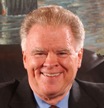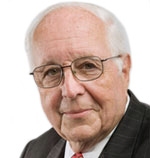By Bob Allen
A Southwestern Baptist Theological Seminary professor hailed the school’s president as a “modern-day Martin Luther” during a recent ceremony in the seminary chapel.
“We owe much to this man,” New Testament professor Terry Wilder said of Paige Patterson, co-founder of a two-decade effort to lead the Southern Baptist Convention to a firm stance on biblical inerrancy, commonly called the “conservative resurgence.”
 Wilder presented Patterson April 17 with a festschrift written in honor of his work alongside Houston layman Paul Pressler and their contribution to the state of the nation’s second-largest faith group today.
Wilder presented Patterson April 17 with a festschrift written in honor of his work alongside Houston layman Paul Pressler and their contribution to the state of the nation’s second-largest faith group today.
“Most of us would not even be here today, were it not for him and Judge Pressler,” Wilder said in remarks quoted in a seminary press release. “If they had not done that under the leadership of the Lord, I dare say the SBC today would be a quagmire of ecumenism, pluralism, universalism and drifting further to the left, not concerned about evangelism as much as we are today.”
“Our president, whether you know it or not, is a modern-day Martin Luther, and we’re thankful for his leadership,” Wilder said.
Luther was a German theologian who died in 1546. His teachings inspired the Protestant Reformation, which in turn helped to reshape medieval Europe.
Patterson and Pressler are credited with coming up with the idea that by electing a conservative SBC president who would in turn appoint only like-minded persons to key committees, before long conservative voices would start to be heard.
 “We are going for the jugular,” Pressler, a Houston appeals-court judge, said at a Sept. 12-13, 1980, gathering in Lynchburg, Va., billed as “A Conference on the Conservative Move in Our State and Our Convention,” and covered by the Virginia Baptist newspaper the Religious Herald.
“We are going for the jugular,” Pressler, a Houston appeals-court judge, said at a Sept. 12-13, 1980, gathering in Lynchburg, Va., billed as “A Conference on the Conservative Move in Our State and Our Convention,” and covered by the Virginia Baptist newspaper the Religious Herald.
“We are going for having knowledgeable, Bible-centered, Christ-honoring trustees of all our institutions, who are not going to sit there like a bunch of dummies and rubber stamp everything that’s presented to them, but who are going to inquire why this is being done, what is being taught — what is the finished product of our young people who come out of our institutions going to be?” Pressler said.
Patterson, at the time president of the Criswell Institute of Biblical Studies in Dallas, delivered two sermons during the Lynchburg gathering.
“The saddest part about our denomination is there is no shame that we’ve lost Wake Forest University completely,” Patterson said. “There’s no shame that we’ve virtually lost the University of Richmond — no shame that in the institutions and even in the pulpits of our Lord the Word of God is not honored and magnified, but rather we talk about sociology and psychology and events of the day.”
Pressler explained the strategy for SBC annual meetings during the next three years. “The bottom line is trustees, not resolutions,” he said. “I’m going to be in Los Angeles to vote for the nominees of the Committee on Boards as a result of Adrian Rogers’ Committee on Committees, because that’s going to make the difference. And I’m going to New Orleans and I’m going to Pittsburgh to vote for the nominees that come out of the Committee on Committees and the Committee on Boards, because that’s going to make the difference.”
“By the time those three committees have gotten their trustees elected – and they will be – then we’ve got 60 percent good, reliable trustees on our institutions,” Pressler said. “Then they’ll pay attention.”
News of those comments prompted 15-20 “concerned” pastors to meet in Gatlinburg, Tenn., to discuss a response to the Patterson-Pressler coalition’s goal of capturing control of the denomination’s agencies and institutions.
“We are taking them at their word,” said Cecil Sherman, pastor of First Baptist Church in Asheville, N.C., who organized the meeting. “I regret this has come to pass, but I feel we have no choice” but to fight back.
During the next decade, both sides fielded presidential candidates in hotly contested elections reported in detail by the national media. Convention attendance swelled to 45,519 in Dallas in 1985 and 40,987 the following year in Atlanta. By comparison, registration at last year’s SBC annual meeting in New Orleans was 7,874.
After the defeat of Daniel Vestal in New Orleans in 1990, moderates withdrew from SBC politics and turned energies toward the Cooperative Baptist Fellowship, a new organization started in 1991.
Wilder, who co-edited the book In Defense of the Bible: A Comprehensive Apologetic for the Authority of Scripture, with Steve Cowen, associate director of the Apologetics Resource Center, said the battle for the Bible within the Southern Baptist Convention is largely over, but new challenges demand attention to ensure that Baptists do not revert to a low view of Scripture.
The book, published by B&H Academic and due out in July, explores challenges including the historical reliability of the Old and New Testaments and harmonizing exegetical and theological conclusions with the findings of science.
Patterson accepted a plaque bearing the book’s cover and told students to expect the fight will come again.
“It was a heavy price to be paid, and I hope others will teach you something about it just so you’ll never walk that valley again, but you will,” Patterson said. “In your lifetime you will have to face the question of the inerrancy of God’s word again and again and again. The devil will always attack that, and you’ve got to always know how it is that you answer.”
